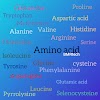Valine | Introduction | History | properties.....
VALINE AMINO ACID
Introduction-
Valine, an essential amino acid, is hydrophobic,
and as expected, is usually found in the interior of proteins. Valine is often
referred to as one of the amino acids with hydrocarbon side chains, or as a
branched chain amino acid. Valine contain α-amino
acid that is used in the biosynthesis of proteins.
It contains an α-amino
group
and α-carboxylic
acid group. A side chain isopropyl group, making it a non-polar aliphatic amino
acid. It is essential in humans, meaning the body cannot synthesize it: it
must be obtained from the diet. Human dietary sources are foods that contain
protein, such as meats, dairy products, soy products, beans and legumes. It
is encoded by
all codons starting with GU (GUU, GUC, GUA, and GUG).
History-
Valine was first isolated from casein in 1901 by Hermann
Emil Fischer. The name valine comes from valeric
acid, which in turn is named after the plant valerian due to the presence of the acid in the roots of the
plant.
Structure-
Properties :-
Chemical formula :- C5H11NO2
Molar mass :- 117.148 g·mol−1
Density :- 1.316 g/cm3
Melting point :- 298 °C (568 °F; 571 K) (decomposition)
Thermodynamic data :- Phase behaviour (solid–liquid–gas)
Sources
Biosynthesis-
Valine, like other branched-chain amino acids, is synthesized by plants, but not by animals. It is therefore an essential amino acid in animals, and needs to be present in the diet. Adult humans require about 4 mg/kg body weight daily. It is synthesized in plants and bacteria via several steps starting from pyruvic acid. The initial part of the pathway also leads to leucine. The intermediate α-ketoisovalerate undergoes reductive amination with glutamate.
Function-
The BCAAs, valine helps repair damaged tissues, promotes
normal growth, provides energy to cells and regulates blood
sugar levels. Valine also stimulates the central nervous system and thus plays
an important role in mental functioning.
The lack of L-valine may influence the
growth of body, cause neuropathic obstacle, anaemia. It has wide applications
in the field of pharmaceutical and food industry.
Valine is one of three branched-chain
amino acids (the others are leucine and isoleucine) that enhance energy,
increase endurance, and aid in muscle tissue recovery and repair.








0 Comments